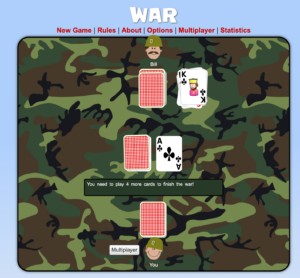For my critical play, I decided to play war (the card game). It is unknown when it was created or who created it. I played war twice—once online with an official website against the computer, and again with a friend.
Unlike many chance-based games that combine luck and skill, war is entirely built on chance. Players have no say on what card they play or when they play it, and there is no skill involved in winning.
War also differs in how simple it is. It only involves each player’s deck and the remaining cards on the table. It lacks the “enchantment” of the gambling devices used in casinos. In theory, players should be able to “see through” the game and resist addiction Yet, I would argue that war can still be as addicting as other games of chance (in part due to this simplicity).
War’s simplicity made it very easy for me as a player to attempt to calculate probabilities in my head. Since I was only playing with one other player, the probability of winning was roughly 50%. Knowing this made me feel more confident in my ability to win. Even though a 50% chance of winning does not mean that I am guaranteed to win half of the time, I still felt that way and pushed myself to keep playing until I won (because it had to come at some point, right?). This is a thought pattern that can make a game addicting. If War were more complex, and I couldn’t guess the probability of winning almost immediately, I probably would’t feel as confident and would feel more reluctant to play.
Another thing that encourages addiction in war is the ability to “draw out” a game. War ends when a player no longer has cards left. Depending on when war is declared in the game (when two players play the same card), there could be several moments when a player has few cards left and thinks they’re about to lose, but suddenly gains many cards and forces the game to go on longer. This leads to the feeling “I was so close to winning” feeling, pushing players to start another game.

What “declaring war” looks like in the game.



